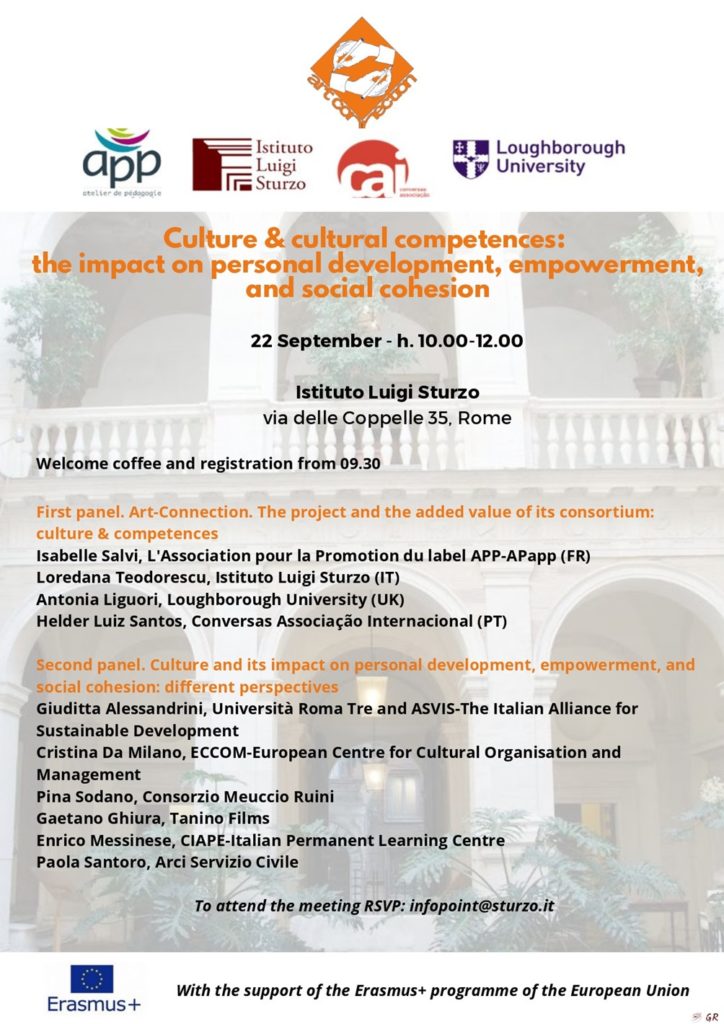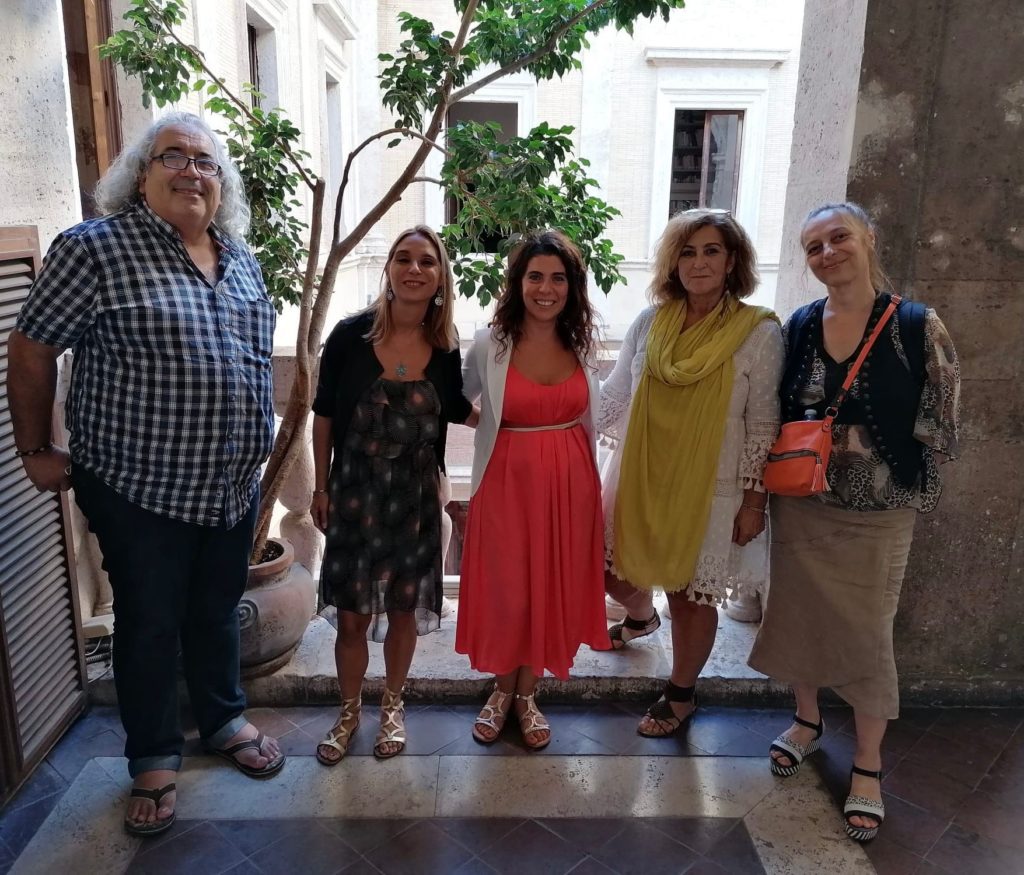25 Sep Synthesis of our event in Rome
On September, 22, 2021, a dissemination event of the Art-Connection project was organised in Rome, at Istituto Luigi Sturzo, entitled “Culture and cultural competences: the impact on personal development, empowerment and social cohesion”.
In a first session, the event aimed at presenting the project and the challenges it would like to address, as well as at highlighting the richness of the partneship promoting it, whereas each partner brings its own specifici experience and complementarity. After that, a second session intended to promote a reflection on cultural competences and culture as a mean for social inclusion, empowerment and personal development, sharing experience and perspectives on the topic together with other representatives of Italian organisations, associations and experts attending the event. This was conceived as the beginning of a needed reflection that would certainly require more time; and to this aim, as an opportunity to engage with a broader group of experts and professionals, creating connections and setting the framework for a discussion to be continued.

The project Art-Connection is focused on cultural competences and its ambition is to bring out and enhance the cultural dimension also as a human experience, enabling the creativity of each person to be mobilized and emerge, and then to become a tool for social cohesion and for the development of other competences. Indeed, the European framework would be incomplete if this dimension would be not be considered as the others.
The first phase of the project, which resulted in a state of art, allowed to highlight what characterizes cultural competences, as the 8th competence part of the European framework of key competences, related to cultural sensitivity and expression.
The definition given by the European Commission is a very broad one: “Competences relating to cultural sensitivity and expression presuppose seeking to understand and respect how ideas and meaning are creatively expressed and communicated in different cultures and across a range of arts and other forms of culture. They require a commitment to understand, develop and express one’s own ideas and sense of belonging or role in society in different ways and in various contexts”.
Indeed, this competence is characterized by its complexity, because it can assume many different forms: we can talk about culture as a mean of social inclusion, as an indivual expression, as openness to others, as a bridge between peoples, which also implies the richness of local cultural traditions, intercultural dialogue and exchange, the language of of arts and creativity.
It is also a transversal competence, because it is often present in other skills and creativity can be used to acquire also other competences, becoming a vehicle for that.
In addition, we know it is often acquired in informal or non-formal contexts; and that it is crucial for both our personal development and our social life. These are therefore essential competences, which can be found everywhere.
However, the event was an opportunity to also highlight the fact that these competences are also the main forgotten part of the competence framework: and here comes the challenge that the project Art-Connection is facing.
Cultural competences are often overlooked and/or underestimated. This is perhaps due to the difficulty of identifying it as a specific competence, because of its very broad definition, which includes several dimensions, and is much closer to individual inclinations than the others.
In addition, it is very difficul to translate the cultural competence into a competence useful for positioning ourselves in the job market, and this reflects the dilemma which sees competences caught between a utilitarian and economic logic on the one hand, and a humanist vision, based on the singularity of the individual, on the other side.
In addition, it is often underestimated the fact that culture is a poweful instrument for social inclusion and can be essential to promote citizenship, that art and creativity can themselves be ideal tools for the acquisition of competences, and its added value as diversified and transversal competence. We often forget that the cultural traditions rooted in a territory represent its identity. We also don’t speak often about the impact that culture and arts can have on the individual sphere, personal growth and development, and how a piece of art can enrich a person just enjoying it.
Finally, we forget that culture, in itself, is a professional sector, and requires specific skills and attitudes which are changing over the time and need to be adapted. Istituto Sturzo is in example of that, being a cultural institute, working on cultural heritage, in a country like Italy, where culture and arts have a very important place for the national identity.
The challenges of cultural competences, which are also the challenges addressed in the project, are therefore related to the peculiarities of these competences. They are not technical competences, but more connected to the human dimension, requiring sensitive and respectful practices.
Being transversal and fluid, it’s important to ensure that cultural competences – especially in informal and non-formal contexts – are recognized, identified, analysed, and brought to the awareness and consciousness of those who possesses it and often are not aware of it. Narrative and biographical practices and tools are useful for giving voice to people, putting them in the condition of being able to tell and reflect on their own life experiences in a transformative sense.
How can we let this cultural dimension emerge? How to promote it? What political and educational strategies we could adopt to this end? The project will try to partially answer to these questions.
In addition to highlighting the cultural competences, as essential yet underestimated, the event was an opportunity for each partner to present their own organisation and their close link to culture: the French APapp, l’Association pour la promotion du label APP- Atelier de Pédagogie Personnalisée, leading the project; the Italian Istituto Luigi Sturzo, as a modern cultural institute in Italy committed to the protection and enhancement of its rich cultural heritage; the Portuguese CAI, focused on social street work with vulnerable groups and young people; and the English Loughbourogh University, leader in the digital story telling. What brings together the partner organisation is the conviction that culture is an asset for all, and that it has a value which citizens should enjoy and to which they can contribute.

The second panel of the discussion was intended as an exchange of views on culture, a sort of marathon of ideas and perspectives involving professionals and experts.
Cristina Da Milano, President of ECCOM-European Centre for Cultural Organisation and Management, specialized in research in the fields of museum education, gave an overview on intercultural dialogue and culture as a tool for social integration. She highlighted the participation in the cultural life as a right, not fully acknowledged nor implemented: as art. 27 of the Declaration of Human Rights states “Everyone has the right to freely participate in the cultural life of the community, to enjoy the arts and to share in scientific advancement and its benefits”; and the importance of intercultural dialogue, as it allows us to prevent ethnic, religious, linguistic and cultural divide. She also brought her experience, looking at museums as potential spaces for intercultural dialogue, and turning them into such space starting from the issues of access, participation, representation.
Pina Sodano, researcher at University of Roma Tre, working on inclusion and integration of migrants and Islamic communities, highlighted then role of culture and arts as a tool for integration of migrants and refugees, showing some practical examples of project developed by her association.
Gaetano Ghiura, filmmaker and producer, told how he uses movies to communicate important messages, promote reflections and engage the younger generation. He brough as an example a docufilm he produced on the future of Europe, accompanying a group of young European people in search for a new Europe on the island of Ventotene, where Altiero Spinelli, one of the founding fathers of Europe, imagined a unified and free Europe while he was confined there during the fascism.
Enrico Messinese, project manager at CIAPE-Italian Permanent Learning Centre, explained the different training activities he is developing for the acquisition and validation of soft skills, as well as transversal competences required in the future labour market, addressing also the cultural sector.
Paola Santoro, Trainer of Arci servizio civile, the biggest organisation in Italy implementing projects of civil service, currently in charge of 69 volunteers who are implementing 15 projects, explained the projects they are promoting specifically in the cultural field, linking the idea of serving your own country to the objective to preserve its culture, identity and history as part of this civil mission.
Giuditta Alessandrini, Full senior professor of Social Pedagogy and Pedagogy of work at University of Roma Tre, and a member of the Secretariat of ASVIS- The Italian Alliance for Sustainable Development, gathering almost 300 associations and organisations of the civil society in Italy dealing with the 2030 agenda and the sustainable goals, made her conclusive remarks, highlighting the link between culture, the Un2030 agenda and sustainability. She started from what the UN Secretary General Guttierez stated in 2019: “culture is a powerful source of identity and resilience”, which is even more important in the pandemic and post-pandemic era. She underlined how culture is an enable to make communities thrive and be sustainable, as the term “culture” includes not only arts and culture, but also modes of life, the fundamental rights of the human being, value systems, traditions and beliefs (as stated in the Mexico Declaration on Cultural Policies of Unesco, 1982).
Therefore, the role of culture in the next decade is essential, also to achieve the UN203 agenda and its goals. She underlined other important aspects in this regard, as the need to localise culture, translating the sustainable goals into the individual and collective lives of citizens; the link between culture and dignity, as cultural practices convey forms of expression, creativity and identity building that relate to the core of human dignity, and as such embody people-centred, sustainable development; the issue of social cohesion and active citizenship, which can be pursued through educational policies promoting individuals; and the importance of strengthening a dialogue between different generations, also through cultural programmes which can foster this dialogue, contribute to reduce inequalities and hold potential for positive social transformation.





